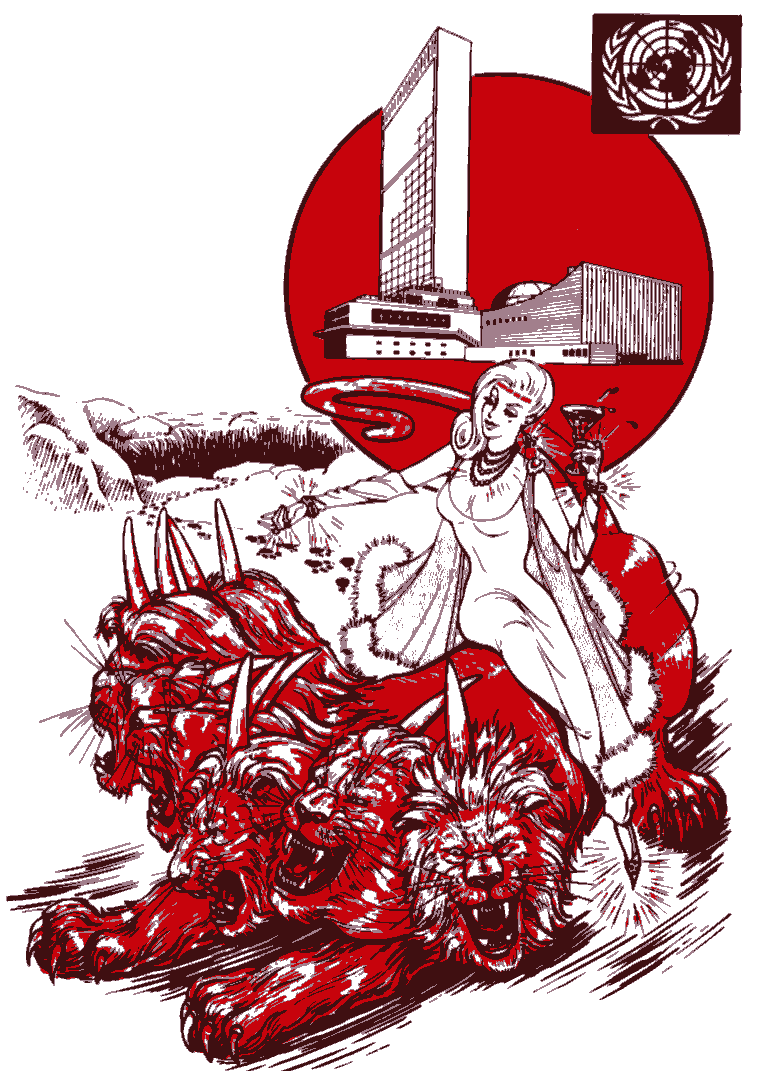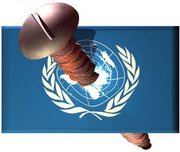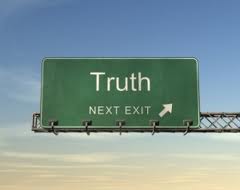
|
Chapter 3 - (2nd Edition) CENSORED MEDICAL STUDIES |

|
|---|
AND ITS WAR ON FREE SPEECH
(CENSORSHIP VIA TREATY )

IMPOSING CENSORSHIP in the name of the Anti-Medical Cannabis Laws.
PAGE 1
BE AFRAID, BE VERY AFRAID:
Starting in late 1998, some very ominous rumors started to circulate regarding the United Nations and their opposition to the rights of Cancer patients to use medicinal Cannabis.
- That the United Nations was planning on censoring ALL medical journals of any positive mentions of Medical Cannabis.
- That the United Nations was going to censor ALL positive mention of medical Cannabis on the Internet.
- That the United Nations was going to censor all positive mention of the use of Medical Cannabis (by its member states) in ALL books, magazines, etc.
- That the United Nations was going to outlaw any positive mention of Cannabis within the News Media (which would include ALL newspapers, magazines, radio and electronic media).
- That the United Nations was planning of criminalizing any political opposition to the war on drugs (including statements being made by politicians running for office), by any of its member states.
REASON MAGAZINE ARTICLE:
Perhaps the Aug-Sept 1998 issue of Reason Magazine carried the best article on the subject.
A DUTY TO CENSOR: [1]
U.N. OFFICIALS WANT TO CRACK DOWN ON DRUG WAR PROTESTERS
In a TV ad that aired worldwide in May, a cleaning woman walks down the hall of the United Nations headquarters in New York. As she approaches the globe in the front of the General Assembly's meeting room, the narrator talks about the organization's 20th Special Session: "On June the 8th, leaders from 185 countries will gather in this room for three days to talk about drugs."
The cleaning woman, beginning with her rag on Thailand, spritzes the globe and "wipes it free of drugs." Her rag becomes a squadron of helicopters spraying fields with herbicide. We see images of high-tech radar equipment, drug-sniffing dogs, and flaming drug laboratories, offset by two classroom shots representing anti-drug education. The narrator concludes: "Three days...this room...and a world of good. A drug-free world...we can do it."
The U.N.'s anti-drug apparatus - which includes the Drug Control Program, the Commission on Narcotic Drugs, and the International Narcotics Control Board (INCB) - seeks to wipe the world free of dissent as well as drugs. The INCB's 1997 report calls for criminalizing opposition to the war on drugs. The nations of the world have not followed through on that recommendation yet, but the spirit behind it has helped prevent a genuine international debate about drug policy.
Based on the 1988 U.N. Convention Against Illicit Traffic in Narcotic Drugs and Psychotropic Substances, the INCB claims that all nations are obliged to enact laws that prohibit inciting or inducing people "by any means" to "use narcotic drugs or psychotropic substances illicitly." According to the INCB's report, offenders include anyone who "shows illicit use in a favorable light" or who advocates "a change in the drug law."
The report criticizes "reputable medical journals" for "favoring the 'medical' use of cannabis," since "such information... tends to generate an overall climate of acceptance that is favorable to" illegal drug use. It also attacks the marketing of nonpsychoactive hemp products, such as clothing and foodstuffs, for "contributing to the overall promotion of illicit drugs."
The INCB even suggests that political campaigns based on calls for drug policy reform may be prohibited under international treaties: "Election campaigns have been conducted with candidates standing for parliament on a drug legalization platform. Some of the candidates for the European Parliament stood on such a platform and were successful. Thus, they were able to use their access and influence to win others over to their cause. Some campaigns, such as the successful campaigns for the 'medical' use of cannabis in Arizona and California in the United States of America, have sought to change the law....
"The Board notes with regret that despite the fact that...Governments of States that are parties to the 1988 Convention are required to make the incitement or inducement to take drugs a criminal offence, either this has not been done or the law has not been enforced. Prominent people have issued some very public calls to take drugs and have not been prosecuted."
The new director of the U.N. Drug Control Program, Pino Arlacchi, has followed up on the 1997 report by attacking European Commissioner for Humanitarian Affairs Emma Bonino, an advocate of drug policy reform. In a March letter to Jacques Santer, president of the European Commission, Arlacchi questioned Bonino's status: "I wish to raise the critical issue of the compatibility of Ms. Bonino's behaviour with the role and functions of a top official of the European Commission," he wrote. "Her main objective seems to be to ridicule the efforts undertaken" by the Drug Control Program. In response, Santer wrote to U.N. Secretary General Kofi Annan, arguing that it is perfectly appropriate for a European commissioner to consider "fundamental questions about the principles, objectives and modalities of the war on drugs."
Kenneth Roth, executive director of Human Rights Watch, noted that the Drug Control Program's position on dissenters has sweeping implications. "Many people...do not share the views about drugs reflected in the U.N. drug conventions and the antinarcotics efforts of many member states," he said in an April letter to the members of the INCB. "Would the [INCB] have member states criminalize advocacy of medical marijuana or of the decriminalization of possession of small amounts of marijuana? Would it have states impose criminal sanctions on people who write books about the sacred truths they have allegedly received from ingesting hallucinogens? Does it really support carting musicians off to jail if their songs are deemed to glamorize drugs?" For anyone who values freedom of expression, the INCB's blithe advocacy of worldwide censorship is pretty scary.
But a more immediate threat is the suppression of politically incorrect views within the U.N. itself. The World Health Organization removed a section from a recent report on marijuana concluding that the drug's hazards pale beside those of tobacco and alcohol. WHO said the section was dropped because "the reliability and public health significance of such comparisons are doubtful." The lead researcher, Robin Room of Canada's Addiction Research Foundation, disagreed. "In my view," he wrote in The (Toronto) Globe and Mail, "enough is known for such comparisons to be useful." The real concern seemed to be the potential reaction from U.N. drug control officials. One source familiar with the controversy says the view at the Drug Control Program is that "anyone who wants to make comparisons [between marijuana and licit drugs] is a legalizer." . . .[more]
COPYRIGHT 1998 Reason Foundation

YOUR UNITED NATIONS
WANT TO KNOW MORE:
=====================
Due to space / download time considerations, only selected materials are displayed. If you would like to obtain more information, feel free to contact the museum. All our material is available (at cost) on CD-Rom format.
CONTACT PAGE
 The CENSORSHIP Files MAIN INDEX |
 ON TO PAGE TWO |